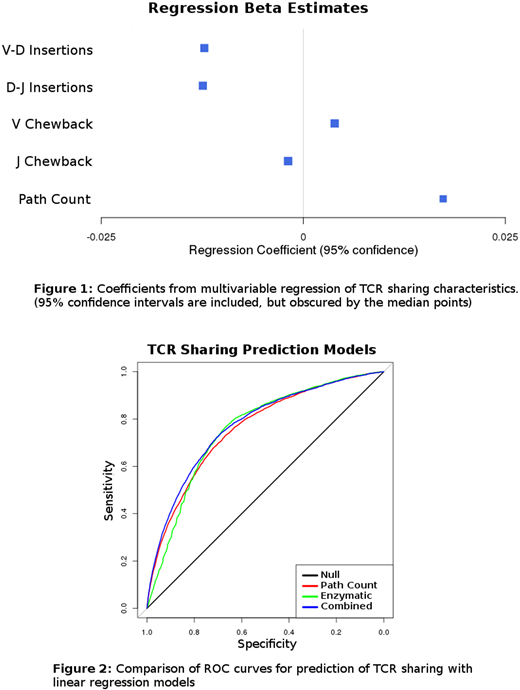Abstract
Background:
There exist shared T cell receptors (TCR) found in the circulating repertoires of healthy individuals. The exact mechanism for why some sequences are more commonly shared is unclear, but it has been hypothesized that the number of recombination permutations of V, D and J segments that produce a particular shared sequence is predictive (i.e. the "convergent recombination" hypothesis). An alternative hypothesis is that sharing is driven by decreased biochemical energy required to generate the shared sequences (i.e. the "enzyme proxy" hypothesis).
Methods:
Circulating T cells were collected from 100 healthy donors and TCR repertoires were profiled. Using a novel algorithm, the number of recombination events that could produce each TCR was calculated ("path count"). Sequence features associated with enzymatic operations - such as V and J region chewback and non-templated nucleotide addition - were calculated as well ("enzymatic" parameters). Multivariable regression was used to identify TCR sequence features associated with TCR clonotype sharing between individuals.
Results:
Nearly 38 million unique TCR sequences from the donor cohort were profiled. Based on regression coefficient analysis of significance, enzymatic parameters were overall negatively associated with TCR sharing (betas [-1.24x10-2 - 3.88x10-3], average -5.67x10-3, maximum p<0.001), while path count had a positive association (beta 1.73x10-2, p<0.001). When these parameters were used to predict sharing, a model using enzymatic parameters had similar performance to a model using only path count. The creation of a model with both enzymatic and path count parameters led to a significant improvement in predictive ability over both models (minimum delta LR 56950, p<0.001). The enzymatic variables and path count had a weak negative correlation (pearson correlation [-0.518 - -0.407]).
Conclusions:
Our findings indicate that TCR sharing is inversely related with increasing complexity of enzymatic operations required during VDJ recombination, and is predictive of receptor sharing between circulating T-cell repertoires in humans. The number of recombination paths is positively associated with TCR sharing, and carries predictive information indepenent of enzymatic operation. This suggests that shared TCRs are favored due to a combination of enzymatic kinetics as well as available recombination paths.
Buntzman:- An Autoimmune Research Fund: Membership on an entity's Board of Directors or advisory committees. Vincent:Merck: Research Funding.
Author notes
Asterisk with author names denotes non-ASH members.


This feature is available to Subscribers Only
Sign In or Create an Account Close Modal